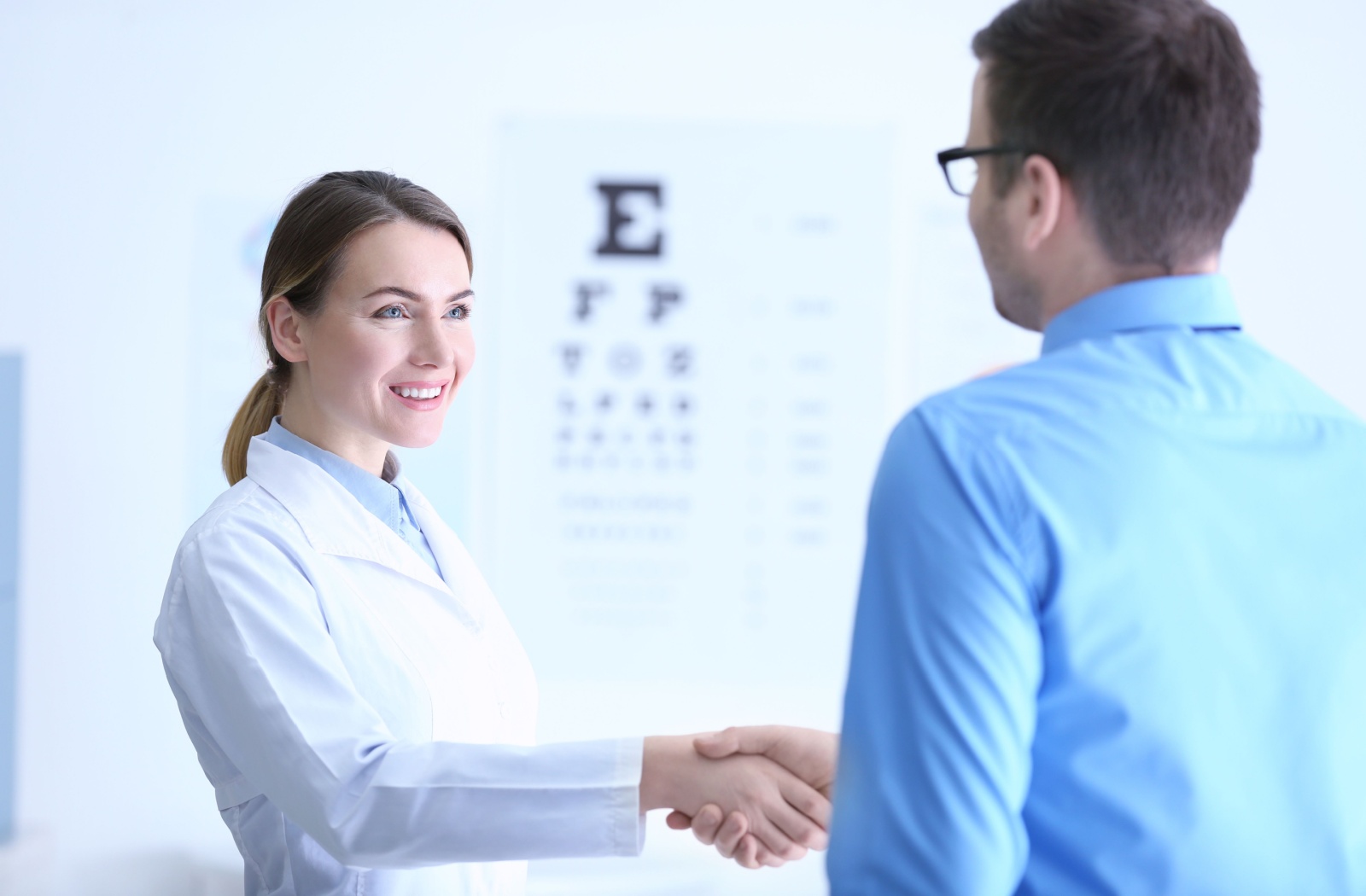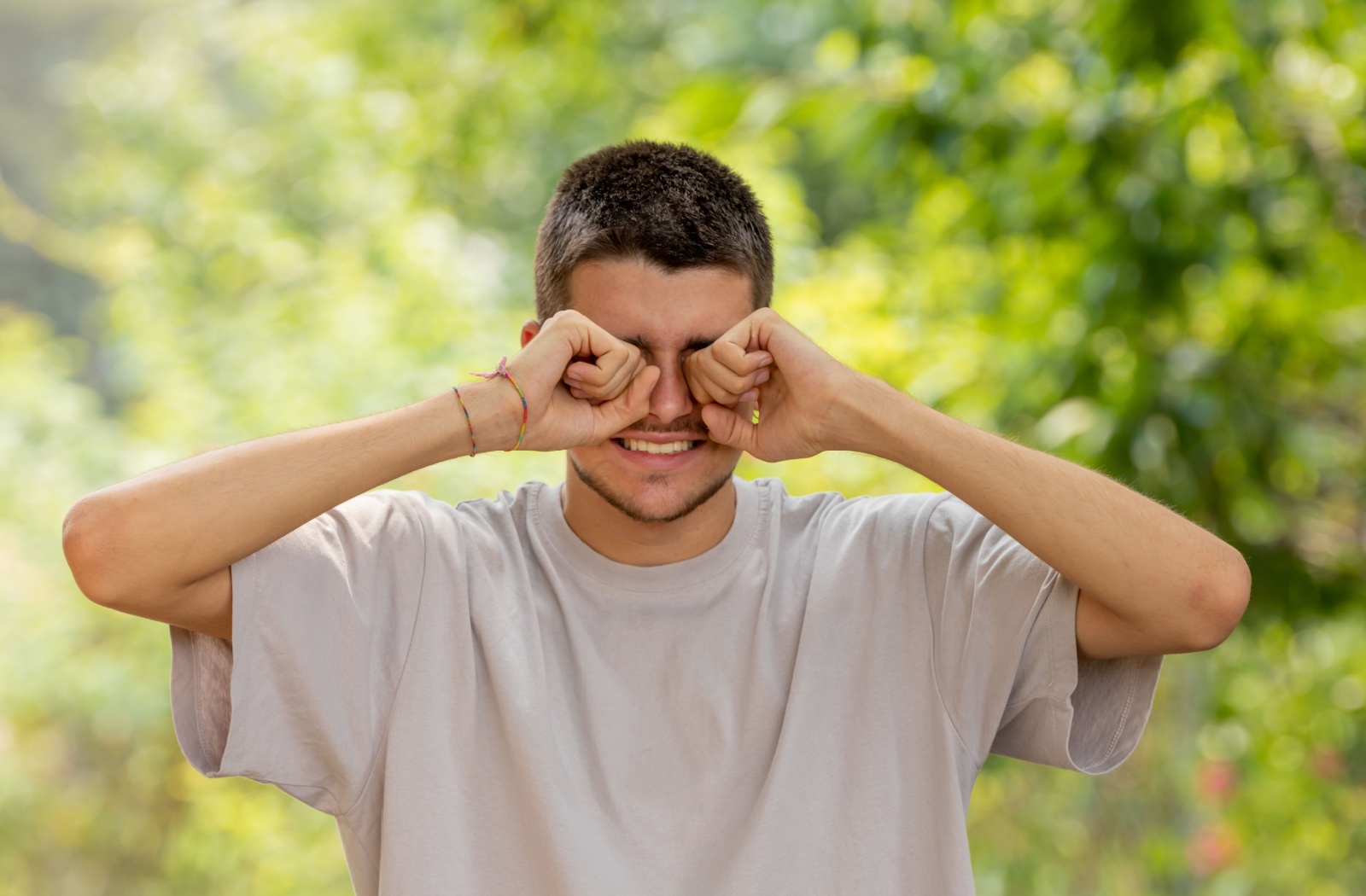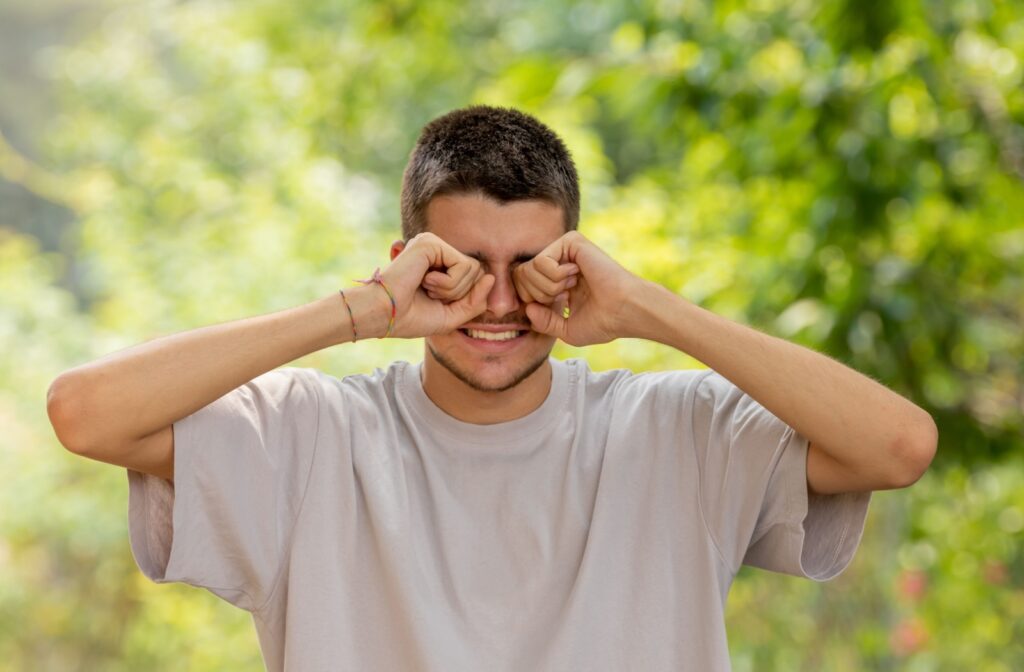Dry eye syndrome, or dry eye, is a common condition that affects millions of people worldwide. It occurs when the eye cannot maintain a healthy layer of tears, leading to discomfort and potential damage to the eye’s surface. A contributing factor to dry eyes is allergies, which can exacerbate symptom frequency and severity.
It’s important to note that while allergies may cause dry eyes, this doesn’t necessarily mean you have dry eye, which is an actual dysfunction within the eye’s systems. You should book an eye exam with your optometrist if you’re having persistent dry eye symptoms, especially if over-the-counter (OTC) medications aren’t providing relief on their own. Your eye doctor can help determine if there is an underlying cause beyond eye allergies bothering your peepers.
Understanding Allergies & Dry Eyes
To understand the link between allergies and dry eyes, we must first grasp the mechanisms of both conditions.
Eye Allergies
Allergies are the body’s hypersensitive immune responses to substances that are usually harmless. Eye allergies, called allergic conjunctivitis, can be seasonal or occur throughout the year, and is an inflammation of the conjunctiva—the white part of your eye.
Allergens can be found in food and the environment and inhaled through the air. The immune system can overreact when these allergens come into contact with the body. This can cause inflammation, irritation, and symptoms such as sneezing and coughing—and relevant to our discussion—itchy, watery eyes.
The body’s immune response to allergens can affect the functions of the tear glands because of inflammation, leading to a reduction in tear production or quality and lead to dry eyes.
Dry Eye
There are 2 primary types of dry eye:
- Aqueous deficient, which is when the eyes don’t produce enough tears for adequate lubrication
- Evaporative, which is when they produce poor-quality tears that evaporate too quickly.
Unlike eye allergies, dry eye’s causes aren’t always rooted in the environment. Anything from medical conditions to medications to eye injuries can cause your eye’s lubrication systems to malfunction. Common symptoms of dry eye include, light sensitivity, blurry vision, mucus discharge, excessive watering, and feeling like something is in your eye.
Common Ground Between Dry Eyes & Allergies
The common factor between dry eyes and allergies is some symptoms they can cause. A significant symptom that we mentioned above is itchy, watery eyes when you’re having an allergic reaction. This can also be a symptom of dry eye. So, your allergies can also worsen or cause dry eye symptoms.
Diagnosis & Treatment
Because allergies can manifest in various ways, including dry eyes, a proper diagnosis typically requires a visit to an eye care professional. During the evaluation, your doctor can consider your medical history and any concurrent conditions, conduct a physical examination of your eyes, and perform tests to measure the volume and quality of your tears.
From there, several treatment options exist:
Lifestyle Changes
Making simple yet effective changes to your daily routine can alleviate symptoms. This may involve:
- Using a humidifier to add moisture to the environment
- Wearing wrap-around glasses to protect the eyes from irritants
- Taking breaks to rest your eyes, especially when engaged in activities that can lead to eye strain
OTC Remedies
OTC eye drops can provide temporary relief from dry eyes. Look for artificial tears without preservatives, which can worsen symptoms for some people. These drops work to improve the eye’s natural moisture balance and provide a protective shield over the surface of the eye.
There are also eye drops specifically formulated to help reduce allergic reactions if you’re experiencing eye allergies. This may be enough to reduce your dry eye symptoms if the allergies are causing them.
Professional Medical Interventions
For severe cases or individuals not finding relief through other means, medical interventions may be necessary. Some dry eye therapy options include:
- Prescription eye drops: These can be more potent and targeted than over-the-counter alternatives
- Punctal plugs: Small inserts placed in the tear ducts to prevent the drainage of tears, keeping the eyes moisturized
- Procedures such as intense pulsed light therapy, which can reduce inflammation and improve tear quality and production
Prevention
The best way to prevent allergic reactions from leading to dry eyes is to manage your allergies proactively. Here are several tips to help you keep allergic symptoms in check:
- Understand your triggers and try to avoid them as much as possible
- Keep your indoor air as clean and dust-free as you can
- Maintain a healthy diet and lifestyle to bolster your immune system
- Take allergy medications as required to prevent reactions
- Regularly clean your eyewear and keep your hands away from your eyes to minimize the introduction of allergens
Implementing these practices can significantly reduce the likelihood of allergy-related dry eye symptoms.

Discuss Your Symptoms with Your Eye Doctor
The correlation between allergies and dry eyes is often overlooked. But for those who experience it, the discomfort is all too real. You can manage allergic dry eyes by understanding the connection between dry eyes and allergies, recognizing the unique symptoms, and pursuing the right diagnosis and treatment.
Call us at Envision Eye Care today to book an appointment. One of our experienced optometrists can review your symptoms and examine your eyes. Then they can offer you a tailored approach to getting the relief you need for discomfort-free vision.



